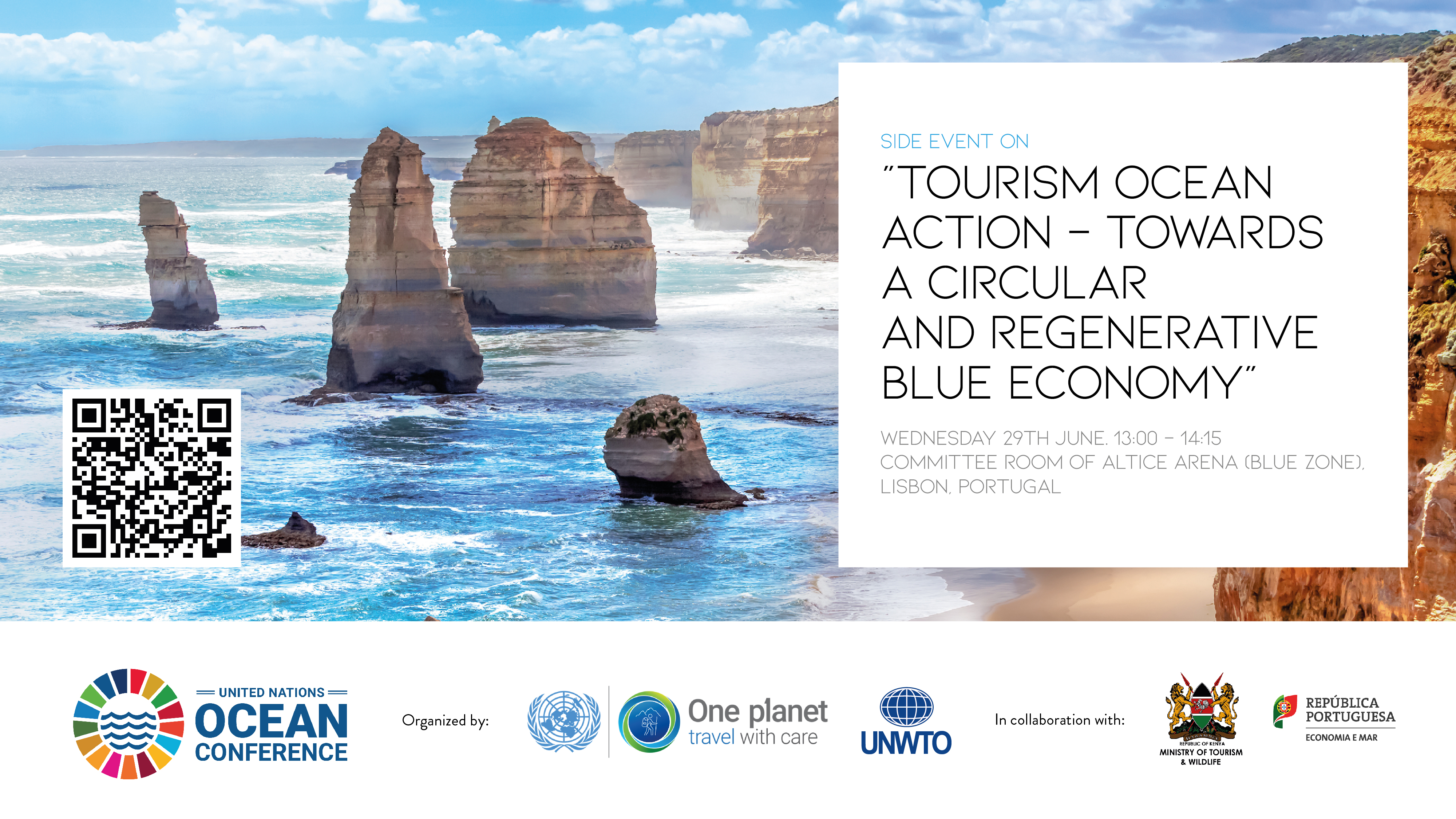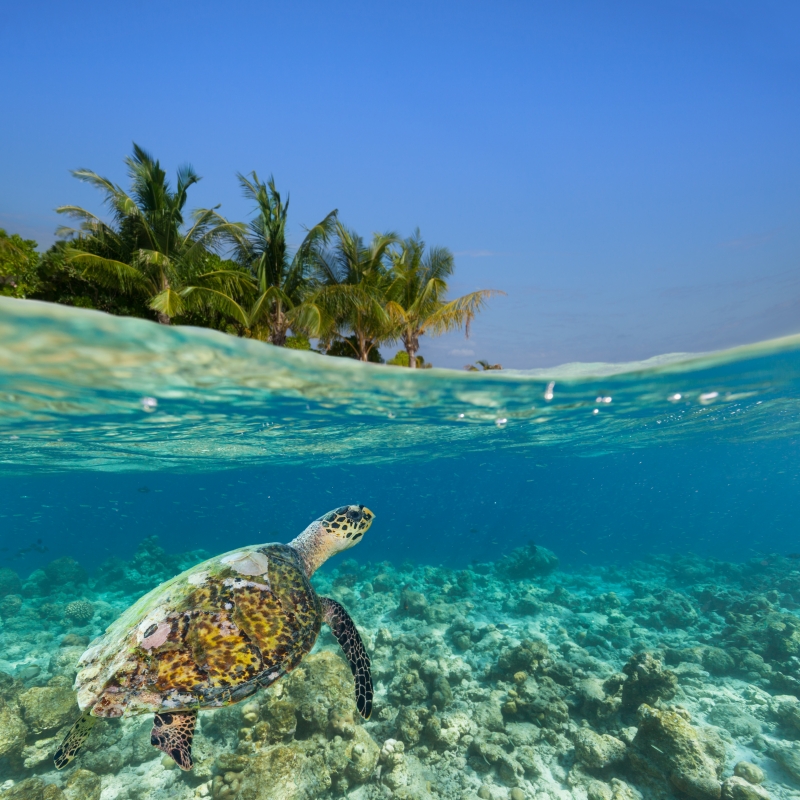
TOURISM OCEAN ACTION
Side event at the UN Ocean Conference
Lisbon, Portugal
29 June 2022, 13:00-14:15 (Lisbon Time)

Tourism Ocean Action - Towards a circular and regenerative blue economy
Side event at the UN Ocean Conference
In the Blue Zone - Committee Room of Altice Arena
Lisbon, Portugal
29th June 2022 from 13:00 – 14:15hrs (Lisbon time)
Tourism is the largest sector of the ocean-based industries representing 40% of its total export value. Coastal and maritime tourism plays a significant role in the economic prosperity of island and coastal communities, bringing jobs, investment and income. Besides the benefits of tourism development, there are also challenges such as the loss of biodiversity, pollution and resource consumption.
At the core of the blue economy is the decoupling of socioeconomic development from environmental impacts. The side-event will focus on sustainable consumption and production as a key strategy to accelerate tourism ocean action. Policy makers and businesses will share policies, strategies and solutions to accelerate the contribution of towards a more circular and regenerative blue economy.
Agenda
Welcome remarks:
- H.E. Mr. Zurab Pololikashvili, Secretary-General, World Tourism Organization (UNWTO) – video
- H.E. Antonio Costa Silva, Minister of Economy and Maritime Affairs, Portugal
- Hon. Najib Balala, Cabinet Secretary for Tourism & Wildlife, Kenya
Keynote:
- Ms. Susan Gardner, Ecosystem Division Director, UN Environment Programme (UNEP)
Roundtable discussion:
- Moderated by Ms. Zoritsa Urosevic, UNWTO Executive Director
Panelists:
- Hon. Faiyaz Koya, Minister of Commerce, Trade, Tourism and Transport, Republic of Fiji - video
- Hon. Najib Balala, Cabinet Secretary for Tourism & Wildlife, Kenya
- Mr. Luis Araujo, President, Turismo de Portugal
- Ms. Catherine Haswell, UN Resident Coordinator, Maldives
- Ms. Gloria Fluxá, CSO, Iberostar Group
- Mr. Frédéric Dégret, CEO, NOAH Regen
- Mr. Graeme Jackson, Head of Partnerships, Travel Foundation
Key issues discussed:
- As the recovery of the sector from COVID-19 progresses, it is essential to embrace the pause in international travel as an opportunity to switch to a blue economy – one that supports people, protects communities and safeguards the ocean – with tourism as the central driving force.
- Tourism relies on a healthy ocean. Coastal ecosystems are top tourism destinations. Almost half of tourists globally choose a coastal destination for their vacation. The competitiveness of the tourism sector depends on healthy blue ecosystems.
- Sustainable consumption and production is a key strategy to accelerate tourism ocean action. Tourism business models should embrace sustainable consumption and production patterns to protect marine and costal ecosystems while driving transformation in the local economy to be more inclusive and resilient.
- A net zero future for tourism will depend on the ocean. Around 25% of emissions are absorbed by the ocean. In 2019, tourism emissions were forecasted to grow by at least 25% by 2030. To ensure an effective transition to blue and green tourism and enable tourism stakeholders to embrace more low carbon operations, there is a need to mobilize finance and incentives.
- Sustainable tourism creates a world where nature thrives alongside people. The demand of tourists for sustainable and regenerative experiences is growing. Regenerative tourism has potential to enhance the ocean’s capacity to sequester carbon through investments in nature-based solutions and innovative approaches.
Key recommendations for action:
- Revisiting governance, policies and instruments: Tourism and environment policy makers shall join forces, as sustainable consumption and production should be the key pillar of tourism plans. Governance needs to be reinforced and policy instruments developed to enable measuring, monitoring and scaling-up tourism ocean action, including the increase of marine and coastal protected areas as tourism destinations.
- Engaging the value chain ecosystem and strengthening partnerships: Every stakeholder in the tourism value chain has a role to play in tourism ocean action. Partnerships and collaboration and sharing experiences are the way forward to galvanize the individual efforts and create synergy.
- Empowering micro, small and medium enterprises (MSMEs) to engage in circular business models: MSMEs, represent over 80% of tourism businesses globally. Enabling a shift towards circularity needs to be addressed and support programmes developed to accelerate ocean and climate action, including access to finance.
- Shifting to a circular economy of plastics: Tourism service providers need to more efficiently use plastics (or any resource), keeping them in use for as long as possible, maximising their value, and then recycling/recovering them to make new products.
- Accelerating decarbonization and regeneration as well as fostering innovation: The tourism sector has the potential to create a virtuous circle at destination level, investing in the protection and regeneration of blue carbon ecosystems that in turn can support the decarbonization of tourism operations.
- Exploring innovative solutions and financing: Piloting technological applications, developing an ESG Framework for tourism, investing in unlocking blue carbon, and nudging consumers towards regenerative ocean experiences, among others, have potential to accelerate tourism ocean action.
For more information, please contact: oneplanetstp@unwto.org

Background
Coastal and maritime tourism plays a significant role in the economic prosperity of island and coastal communities, bringing jobs, investment and income. Besides the benefits of tourism development, there are also challenges such as the loss of biodiversity, pollution, resource consumption and overtourism. For instance, a large proportion of marine plastic litter has been found to come from tourism and other related value chains in coastal areas. Tourism emissions have also been forecasted to increase by 25% by 2030 under a business as usual scenario.
Placing sustainability at the heart of the recovery of tourism from COVID-19 is essential to transition to a more circular, regenerative and resilient tourism model capable to balance the needs of people, planet and prosperity and which addresses unsustainable consumption and production as one of the underlying causes of pandemics, climate change, biodiversity loss and pollution.
Investing in the transformation of coastal and marine tourism supports longer-term goals such as the protection of ecosystems and climate change which not only underpin the global economy but also offer opportunities for creating green and decent jobs and pay real time dividends, which are particularly relevant for tourism dependent countries such as Small Island Developing States.